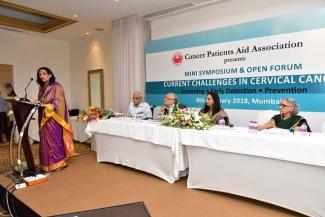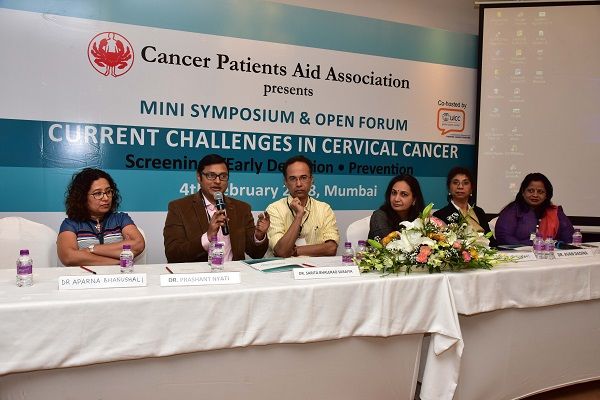
On World Cancer Day, CPAA along with UICC held a mini symposium to address the 2nd most common cancer in India; Cervical Cancer. Keynote speaker, Dr Sarita Bhalerao (Gynaecologist & Obstetrician) provided a comprehensive view of Cervical Cancer.
Dr Suresh Advani (Medical Oncologist) graced the occasion commencing the ceremony with good news about Cervical Cancer.
- Decreased incidence rates reported in India and globally.
- 60% survival rate with treatment.
- Increased screening and prevention programs.
But clearly there is a lot that still needs to be done. Dr Sarita Bhalerao (Gynaecologist & Obstetrician) answered several key questions on Cervical Cancer.
1. Can you tell us a little about HPV?
Human Papilloma Virus or HPV is a sexually transmitted infection that affects both men and women. HPV has many strains and some of these strains are oncogenic leading to Cervical Cancer in women and Oropharyngeal/Anal/Penile cancers in men. It must be notes that most people will get exposed to HPV during their lifetime. 70 to 90% of women clear the HPV infection within a few months without evening knowing they have been exposed. If the immune system is unable to clear an infection or if the infection persists, it can lead to CIN (abnormal cervical cell growth) or invasive cancer. This depends on the strain of HPV that one is exposed to. Most cancer causing strains of HPV are 16, 18, 31 etc. Benign strains of 6 and 11 usually cause only harmless warts.

2. What is the burden of Cervical Cancer in India?
85% of the Cervical cancer burden lies with the developing countries and India contributes to 27% of all cases worldwide. Western countries have reduced their incidence rates with stringent prevention programs.
3. How can you screen for HPV?
There 3 most commonly screening methods used world over for screening of Cervical cancer:
- Cytology/Pap smear tests: Can be conventional or liquid. Looks for pre-cancer cells on the cervix.
- HPV DNA testing detects HPV virus strains that can lead to cancer.
- Visual Inspection using a speculum and acetic acid to detect early stages of cancer.
4. Which screening is most effective?
Pap smears have been the gold standard of screening so far because of high specificity. However, the sensitivity of Cytology testing is low and varied between 31-78% and it requires high expertise and quality control, repeated results thus leading to and higher costs long-term.
HPV DNA test has emerged as the latest and more efficient tool for detecting cancer causing HPV in the body. It has high sensitivity, is most objective and reproducible. It can be used for women who have cervical cancer as well as those who are at high risk for it. Countries such as Australia have now made HPV DNA testing the standard screening for Cervical Cancer. Several countries have started co-testing (using both tests for screening).

5. What are the cons of HPV DNA testing?
Some disadvantages of HPV DNA testing include low specificity, higher cost and need for sophisticated laboratory. It is also not recommended for women under 30 years of age.
6. What are the guidelines of screening as per WHO?
Start regular pap smears at the age of 21. Repeat every 3 years till age 29.
At 30, HPV testing is recommended along with the pap smear (co-testing). Repeat every 5 years.
Screening can stop at age 65.
7. How does HPV DNA testing alleviate the burden of screening in India?
It is more effective and more specific than pap smears. Just one test can downgrade the incidence rates. For population screening, it can bring down the costs as well since it needs repetition at 5 and not 3 years.
8. What advice can you give mothers who are hesitant to vaccinate their children?
My advice is to provide information and educate the mothers and daughters about the benefits of vaccination. Some mothers are worried that the vaccine may introduce the virus. Be rest assured that the vaccine is non-infective and devoid of viral DNA i.e. there is no risk of acquiring the infection by taking the vaccine. Additionally, >280 million doses of the vaccine have been administered globally with no serious adverse events linked to the vaccine.
9. How effective is HPV vaccine?
The HPV vaccine is most effective when administered to girls who are sexually naïve (never been sexually active). For sexually active girls, the vaccine will protect against subtypes that cause cancer. As age increases, the benefits of the vaccine become less but women of any age can take the vaccine. For boys, the vaccine protects against oropharyangeal, penile and oral cancers. Since, these rates are fairly low, vaccination for boys and men is not mandatory.
10. How is the vaccine currently prescribed?
Globally there are 3 vaccines brands available. In India, only 2 are currently available. Below the age of 15, 2 doses are prescribed. For girls above 15, 3 doses are recommended.






